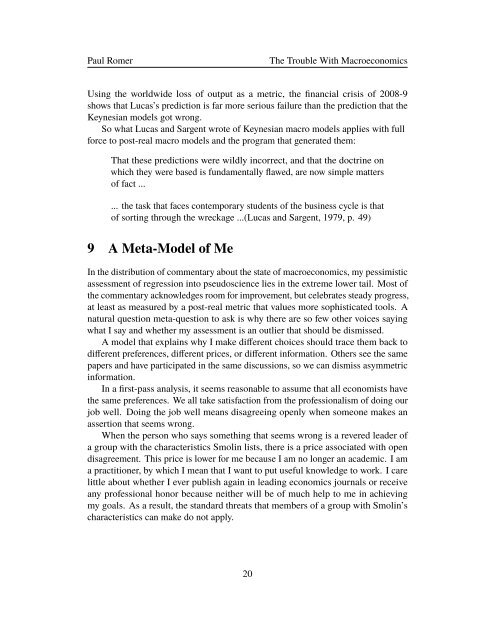The Trouble With Macroeconomics
eziYxDX
eziYxDX
Create successful ePaper yourself
Turn your PDF publications into a flip-book with our unique Google optimized e-Paper software.
Paul Romer<br />
<strong>The</strong> <strong>Trouble</strong> <strong>With</strong> <strong>Macroeconomics</strong><br />
Using the worldwide loss of output as a metric, the financial crisis of 2008-9<br />
shows that Lucas’s prediction is far more serious failure than the prediction that the<br />
Keynesian models got wrong.<br />
So what Lucas and Sargent wrote of Keynesian macro models applies with full<br />
force to post-real macro models and the program that generated them:<br />
That these predictions were wildly incorrect, and that the doctrine on<br />
which they were based is fundamentally flawed, are now simple matters<br />
of fact ...<br />
... the task that faces contemporary students of the business cycle is that<br />
of sorting through the wreckage ...(Lucas and Sargent, 1979, p. 49)<br />
9 A Meta-Model of Me<br />
In the distribution of commentary about the state of macroeconomics, my pessimistic<br />
assessment of regression into pseudoscience lies in the extreme lower tail. Most of<br />
the commentary acknowledges room for improvement, but celebrates steady progress,<br />
at least as measured by a post-real metric that values more sophisticated tools. A<br />
natural question meta-question to ask is why there are so few other voices saying<br />
what I say and whether my assessment is an outlier that should be dismissed.<br />
A model that explains why I make different choices should trace them back to<br />
different preferences, different prices, or different information. Others see the same<br />
papers and have participated in the same discussions, so we can dismiss asymmetric<br />
information.<br />
In a first-pass analysis, it seems reasonable to assume that all economists have<br />
the same preferences. We all take satisfaction from the professionalism of doing our<br />
job well. Doing the job well means disagreeing openly when someone makes an<br />
assertion that seems wrong.<br />
When the person who says something that seems wrong is a revered leader of<br />
a group with the characteristics Smolin lists, there is a price associated with open<br />
disagreement. This price is lower for me because I am no longer an academic. I am<br />
a practitioner, by which I mean that I want to put useful knowledge to work. I care<br />
little about whether I ever publish again in leading economics journals or receive<br />
any professional honor because neither will be of much help to me in achieving<br />
my goals. As a result, the standard threats that members of a group with Smolin’s<br />
characteristics can make do not apply.<br />
20


